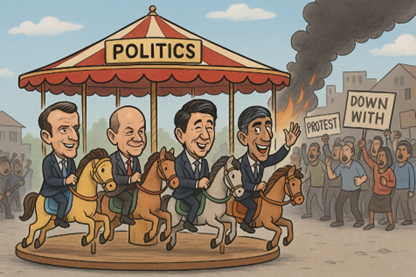



How democracies keep changing prime ministers, and why the carousel won’t stop
By Ravishankar Kalyanasundaram
It is a picture at once familiar and absurd: Emmanuel Macron, president of France, finds himself again in the unenviable position of appointing yet another prime minister. François Bayrou, who only recently tried to shepherd a €44 billion deficit-cutting plan, was bundled out by a confidence vote before he could find his footing on the staircase of Hôtel Matignon. For Macron, this is the fifth prime minister of his current term—hardly a record to boast of, unless one is competing for entries in the Guinness Book under “fastest turnover of cabinets.”
The French, to their credit, take such political tempests with a Gallic shrug. But Paris is only the latest stop on a carousel that spins with increasing velocity across the world. Across the Channel, Britain has been through leaders like commuters through the Tube. In Berlin, a grand coalition splintered under the weight of conflicting fiscal promises. Tokyo has quietly resumed its pastime of changing leaders with the regularity of the cherry blossom. And in Canberra, leadership spills have become so routine they barely make the front page.
The Causes: A Perfect Storm
Why does this happen? Political pundits, seasoned columnists, and elder politicians point to a convergence of forces rather than any single failing.
Fragmentation. Party systems that once offered voters a simple binary—Labour vs. Conservative, Christian Democrats vs. Social Democrats—now splinter into kaleidoscopes. Greens, nationalists, single-issue outfits, and populists chip away at the old blocs. The arithmetic of majority becomes impossible. Governing coalitions grow so wide that their programs resemble patched quilts; when the first storm comes—say, a budget vote—the seams tear.
Permanent fiscal stress. After the pandemic and amid ageing populations, treasuries are stretched. Welfare budgets rise, pensions demand billions, defence spending climbs, and the green transition adds fresh bills. Leaders who attempt austerity—like Bayrou in France—invite political suicide. Those who promise largesse meet market distrust. Damned if you cut, damned if you spend.
The politics of poly-crisis. Inflation spikes, migration surges, climate shocks, war in Ukraine—all compress the time horizons of politics. Leaders who once counted on four years of grace now see approval ratings collapse in four months. The electorate, restless and anxious, punishes quickly.
The media and party cycle. A scandal that might once have dented a leader’s popularity now destroys careers in days. Internal party mechanisms—confidence letters, leadership ballots, spills—have become recall buttons, pressed at whim. The acceleration of news has shortened political half-lives.
Institutions lag reality. The Westminster system, designed for two-party duels, now struggles under multiparty splinters. Semi-presidential France, with its divided legislature, becomes a wrestling match between president and parliament. Germany’s proportional system, once admired for stability, now produces fragile three-way marriages.
Britain’s Karma
Observers note with wry amusement that nowhere is irony richer than in Britain. Having once exported Westminster democracy as the world’s model of stability, it now stages some of the most farcical performances at home. Prime ministers march into Number Ten with fanfare only to march out again with cardboard boxes before the wallpaper dries.
So far, so good for Labour—at least the locks on Downing Street haven’t needed changing. But the Deputy Prime Minister’s sudden resignation has already set tongues wagging. In today’s mood, even that chair seems fitted with a revolving hinge. One imagines the porter at Number Ten keeping a stack of doormats, ready to flip from “Welcome” to “Farewell” at a moment’s notice.
Commentators call it a touch of karma. For centuries, Britain lectured colonies on the virtues of parliamentary restraint. Today, it is Britain itself that reels under its own system: leaders undone not by coups or revolutions, but by backbench rebellions, tabloid storms, and budgets voters refuse to stomach. Humour more than hostility colours the scene—karma here carries an umbrella, tips its bowler hat, and politely ushers another prime minister to the exit.
The Neighbourhood Contrast
If Westminster’s revolving door looks absurd but harmless, South Asia presents a darker tableau. In Sri Lanka, Bangladesh, and now Nepal, political tempests have burst beyond the walls of parliaments and spilled onto the streets. Leaders here run not from confidence votes but from angry crowds, ducking barricades instead of ballots. The contrast is stark.
One wonders what counsel to offer. Should neighbours learn from the West, where bruises are traded inside parliaments, governments rise and fall, and the players return home to memoir contracts and after-dinner speaking tours? Or should they look to India’s courts, where political quarrels are dragged into legal proceedings, and the lesson meted out is tolerance, patience, and endurance?
The humour is in the outcomes. Western politicians, when toppled, return home largely unscathed—lighter in office but heavier in publishing deals. Their Indian counterparts, after courtroom jousts and electoral skirmishes, often emerge sturdier, their reputations paradoxically strengthened. Meanwhile, the neighbourhood struggles with crowds in the streets, teargas in the air, and leaders whose exits resemble escape acts.
The Punchline
Perhaps the real lesson is not that one system is superior to another, but that political tempests come in many forms. Some are managed in parliaments, some in courts, others, regrettably, in the streets. What they share is a reminder that democracy, whether in Paris, London, Colombo, Dhaka, or Kathmandu, is rarely tranquil.
The merry-go-round spins everywhere. The difference lies in whether leaders step off with dignity, with lawsuits, or with army escorts.